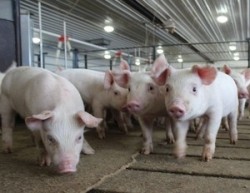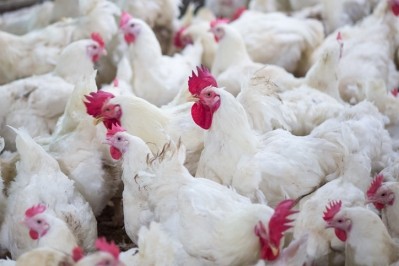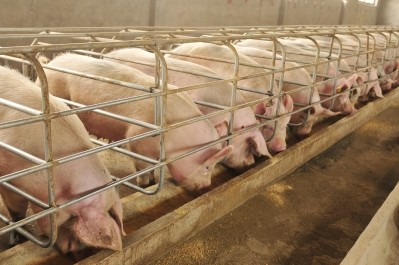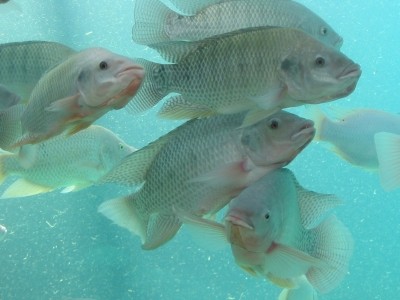Diet density, enzymes influence growth of finishing pigs

A group of Korean researchers examined the use of supplemental protease on high and low density corn-soybean diets. The team reported its findings in the journal of Animal Feed Science and Technology.
“The objective of the current study was to evaluate the influence of low or high density corn and soybean meal-based diets and protease supplementation on growth performance, apparent total tract digestibility, blood characteristics, and noxious gases emission in finishing pigs,” they said.
The experiment looked at the results in regards to growth performance and co-efficient of apparent digestibility (CATTD), said the researchers.
“Dietary supplementation with 125 g/t of protease has beneficial effects on growth performance and CATTD,” they said in the paper. “The stress related hormones were also reduced in pigs fed protease supplemented diets. In addition to tendency in weight gain, feed efficiency was improved in pigs fed high density diets than low density diets.”
Why protease?
Feed can account for up to 70% of variable swine production costs, said researchers in the report. Exogenous enzymes can be used to improve digestion and availability of nutrients in the diet.
Previously, the use of enzymes including α-amylase, β-mannanase, xylanase and protease has been found to offer benefits to pigs and poultry, they said. But most of the work has looked at poultry.
In poultry, the use of protease has been found to improve growth, the feed conversion ratio, energy and crude protein digestion and amino acid digestibility, said the authors. The use of protease in feed may boost nitrogen use, allow for inclusion of cheaper feed ingredients, and make manure handling easier.
“Protease treatment can also be used to degrade protein anti-nutrients found in feed (Yu et al., 2006, Wang et al., 2011, Guggenbuhl et al., 2012 and Adebiyi and Olukosi, 2015). Rooke et al. (1998) noted that protease treated soybean meal degraded protein anti-nutrients and improved live weight gain in piglets,” they said.
But limited work has been done examining the interaction with enzyme supplementation and corn-soybean based diets, said the researchers. “Furthermore, we were interested in evaluating the influence of mono-component protease on high and low density diets as well as their interactive effects,” they added.
Experiment details
In the experiment, 140 pigs were given one of four diets for a 12-week trial, said the researchers. The diets included either high or low nutrient density and with or without 125g/t protease supplement. The enzyme used is commercially available.
Body weights were noted at the start, midpoint and end of the trial, they said. Average daily gain (ADG), average daily feed intake (ADFI) and the gain to feed ratio (G:F) were determined and a dietary marker was used to establish dry matter (DM), nitrogen (N) and energy digestibility.
Manure and blood samples were taken at the midpoint and end of the experiment, they said. Fecal and urine samples also were recorded on days 14 and 42.
Results
The protease additive increased ADG and the G:F for the second half of the trial, said the researchers. The ratio also saw improvement for the total experimental period.
“The noxious gases were not affected by density diets and protease,” they said. “No interactions were observed between the diets and protease for nutrient digestibility, blood profiles and noxious gases emission.”
The high density diet improved ADG, compared to the low density diet, for the first and second halves of the experiment, along with the overall period, they said. The higher density diet also had larger levels of creatinine during the final stage and improved feed efficiency.
A trend of combined effect from the high density diet and supplemental protease was noted for the second half of the experimental period. “The response to protease supplementation was larger in pigs fed the low nutrient dense diet compared with the pigs fed high nutrient dense diet,” they added.
The CATTD of dry matter, N and energy was improved for pigs getting the supplemental protease, said researchers.
“Nitrogen digestibility tended to increase in high density diet than low density diet during week 6,” they said. “The supplementation of protease in the diet led to significantly higher level of creatinine during week 6 and lower levels of cortisol and epinephrine in blood serum during week 12.”
Source: Animal Feed Science and Technology
Title: Influence of low or high density corn and soybean meal-based diets and protease supplementation on growth performance, apparent digestibility, blodd characteristics and noxious gas emission of finishing pigs
DOI: doi:10.1016/j.anifeedsci.2016.04.003
Authors: Santi Devi Upadhaya, Hyeok Min Yun, In Ho Kim



![The addition of xylanase to wheat base diets decreased digesta viscosity and fermentation, increased nutrient digestion and digesta passage, and reduced the amount of nutrients available to the microflora: study [pic: (c) istock.com Sage78]](/var/wrbm_gb_food_pharma/storage/images/_aliases/wrbm_medium/1/1/9/3/1423911-1-eng-GB/Producer-makes-the-case-for-enzymes-in-shift-away-from-AGPs.jpg)







